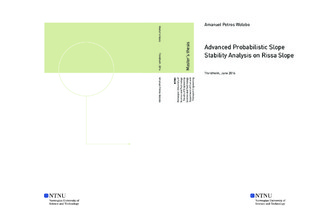| dc.description.abstract | Probabilistic analysis is powerful in investigating the influence of uncertainties on a given geotechnical problem. The way to conduct an uncertainty quantification in geotechnical engineering is shown in a particular case study, Rissa slope. Advanced probabilistic slope stability analysis is conducted to calculate the factor of safety and failure probability of Rissa slope. Probabilistic assessments are made to study the relative influence of variability and spatial correlation. To account for uncertainties, interpretations of soil properties are made based on a probabilistic link between the CPT data and soil parameters. Accounting for uncertainties while determining soil parameters brought confidence in predicting the output behavior. Conditional random field is generated to characterize spatial variability of soil parameters. Lastly, the potential of the framework of uncertainty quantification, the effects of spatial soil variability and local averaging are realized by conducting probabilistic analysis with a Monte Carlo sampling technique. | |

